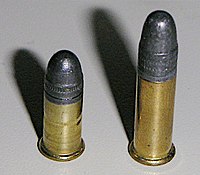.22 Short
| .22 Short | ||||||||||||||||
|---|---|---|---|---|---|---|---|---|---|---|---|---|---|---|---|---|

.22 Short, left; .22 Long Rifle, right
|
||||||||||||||||
| Type | Rimfire | |||||||||||||||
| Place of origin | United States | |||||||||||||||
| Production history | ||||||||||||||||
| Manufacturer | Smith & Wesson | |||||||||||||||
| Produced | 1857 | |||||||||||||||
| Specifications | ||||||||||||||||
| Bullet diameter | .222 in (5.6 mm) | |||||||||||||||
| Neck diameter | .226 in (5.7 mm) | |||||||||||||||
| Base diameter | .226 in (5.7 mm) | |||||||||||||||
| Rim diameter | .278 in (7.1 mm) | |||||||||||||||
| Rim thickness | .043 in (1.1 mm) | |||||||||||||||
| Case length | .421 in (10.7 mm) | |||||||||||||||
| Overall length | .695 in (17.7 mm) | |||||||||||||||
| Rifling twist | 1-20" or 1-24" | |||||||||||||||
| Primer type | Rimfire | |||||||||||||||
| Ballistic performance | ||||||||||||||||
|
||||||||||||||||
.22 Short is a variety of .22 caliber (5.6 mm) rimfire ammunition. Developed in 1857 for the first Smith & Wesson revolver, the .22 rimfire was the first American metallic cartridge. The original loading was a 29 or 30 gr (0.066 or 0.069 oz; 1.879 or 1.944 g) bullet and 4 gr (0.0091 oz; 0.2592 g) of black powder. The original .22 rimfire cartridge was renamed .22 Short with the introduction of the .22 Long in 1871.
Developed for self defense, the modern .22 Short, though still used in a few pocket pistols and mini-revolvers, is mainly used as a quiet round for practice by the recreational shooter. The .22 Short was popularly used in shooting galleries at fairs and arcades; several rifle makers produced "gallery" models for .22 Short exclusively. Due to its low recoil and good inherent accuracy, the .22 Short was used for the Olympic 25 meter rapid fire pistol event until 2004, and they were allowed in the shooting part of modern pentathlon competitions before they switched to air pistols.
Several makes of starter pistols use .22 Short blank cartridges. Some powder-actuated nail guns use the .22 Short cartridge as a power source.
Most .22 Short bullets are made of lead (usually coated with grease or wax, or copper) in round nose or hollow point styles. Bullets for use at shooting galleries were often made of compressed powdered metal that disintegrated on impact to avoid ricochets and over-penetration of backstops. The standard velocity .22 Short launches a 29-grain (1.9 g) bullet at 1,045 feet per second (319 m/s) with 70 ft·lbf (95 J) of energy from a 22 in (559 mm) rifle barrel and can penetrate 2 inches (51 mm) of soft pine.
...
Wikipedia
